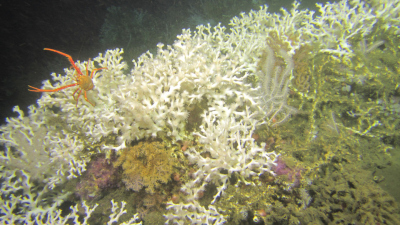- Home
- Discover
- Media Releases
- Media Releases 2020
- Corals Angola
New study: Corals in the deep sea adapt to extreme oxygen depletion
The cold-water coral Lophelia pertusa is one of the most widespread reef-building species in the deep sea. Its distribution in water depths between about 200 and 1,000 meters is controlled by various environmental factors, such as concentration of dissolved oxygen and temperature. During an expedition with the research vessel METEOR, however, the team on board discovered previously unknown cold-water coral reefs off the coast of Angola that they had not expected to find in this region. The South Atlantic is a very productive region, which is why a so-called oxygen minimum zone is formed there. "Thus, according to the textbooks, there should be no thriving cold-water corals there", explains first author Prof. Dierk Hebbeln from MARUM – Center for Marine Environmental Sciences at the University of Bremen.
The coral colonies were found in water depths between 250 and 500 meters. Their size, the article says, proves that the cold-water corals have been living at this site for many years - and obviously benefit from the high food supply in the upwelling system off the coast. A lot of food can therefore compensate for the lower oxygen supply. This suggests that ecological niches of cold-water corals differ regionally. "The regional adaptation of the Angolan cold water corals to such extreme conditions sheds new light on their potential capability to cope with expected future environmental changes in the ocean," the article says. The study therefore also suggests that a predicted decrease in dissolved oxygen concentrations in the ocean due to global warming alone is unlikely to have the negative impact on cold-water corals that has been expected so far. However, a decrease in food supply to the deep sea isalso expected in the future, which could have an impact on the corals' capability to adapt.
During the expedition in January 2016, samples were taken and data collected from onboard RV METEOR. The remotely-operated vehicle MARUM-SQUID, a lander and a CTD rosette measuring temperature, conductivity and oxygen were used.
Dierk Hebbeln, Claudia Wienberg, Wolf-Christian Dullo et al.: Cold-water coral reefs thriving under hypoxia. Coral Reefs (2020). DOI: 10.1007/s00338-020-01934-6



